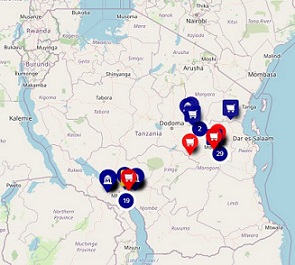Introduction
Mtandao wa Vikundi vya Wakulima Tanzania -MVIWATA is a national farmers organisation which brings together small holder farmers from all regions of Tanzania in order to have a common voice to defend economic, social, cultural and political interests of smallholder farmers. Literally, MVIWATA is Swahili acronym for the National Network of Small-Scale Farmers Groups in Tanzania.
Founded in 1993 by smallholders themselves, MVIWATA aspires to empower smallholder through capacity strengthening to undertake lobbying and advocacy especially by strengthening their groups and networks, facilitating communication and learning so that they defend their interests. Currently MVIWATA is the largest small-holder farmers grassroot movement in the country with branches in all regions in the mainland and Zanzibar spiralling down to village levels.
MVIWATA was founded as a result of the deteriorating smallholder farmers’ welfare and lack of a common platform to organize following the contradictions that the Neo-liberal market forces brought after the Structural adjustment programmes. Sokoine University of Agriculture (SUA) through its Strengthening Communication Project (SUA-SCOM) and the early identified farmers groups guided the initial process in the formation of MVIWATA.
The slogan of MVIWATA is ‘Mtetezi wa Mkulima ni Mkulima Mwenyewe’ literally meaning the defender of a farmer is the farmer.
MVIWATA was registered in 1995 under the Society Ordinance Act (Registration number SO 8612). Following the introduction of the Non-governmental Act of 2002, MVIWATA received a compliance certificate in 2007 under registration number 1930. Under this Act, MVIWATA is a non-profit organisation. In Tanzania, Farmers’ organizations are registered under NGO Act, Society Ordinance, Company Act or Cooperative Act depending on the scale and key functions of the organisation.
Our mission: To unite smallholder farmers in groups and networks in order to protect their interests through capacity development, facilitating communication and advocacy on policies and systems
Our vision: Empowered smallholder farmers work together to advocate, defend and advance their interests by influencing policies and systems
Key Factors for the Formation of MVIWATA
- Disregard of the smallholders in the policies, strategies and programmes
- Challenges related to produce markets, financial services, representation and recognition of the smallholder farmers
- Quest to have a national organisation that represents smallholder farmers
Organisation Structure
The structure of MVIWATA is composed of the Annual General Meeting (AGM) which is the supreme body of the organisation organised annually with representation of members from all MVIWATA networks, the Board of Directors composed of smallholder farmers whose main role is to provide the strategic leadership of the organisation and is elected every three years and the management which is composed of the team of staff.
The approaches and strategies of MVIWATA are mainly built on the structure of MVIWATA, organized at different levels from grassroots to national levels
1. National level:
Comprises of all members of the network as represented by the Annual General Meeting (AGM), the Council, the Board of Directors and the management team.
The Board of Directors and the Management has the responsibility of overseeing that the overall mission and strategic orientations of the network are adhered to and that services are provided to members. They have further roles of facilitating technical support as well mobilising resources.
The Board of Directors is composed of 9 elected members and Headed by the Chairperson. The Council is composed of the Board Members and Leaders of Middle Level Networks. Management team is composed of Staffs with various disciplines and headed by the Executive Director.
2. Middle level:
Composed of farmers’ networks at regional or district level. It has a Steering Committee and has the responsibility of mobilising members in its area. Where a management of middle level network exists, it has the responsibilities of providing technical support to member and resource mobilisation. Middle level networks liaise with the national level and local networks.
3. Local networks:
These are farmers groups organised in networks at village and ward levels and are the building blocks of the middle level and national networks.






